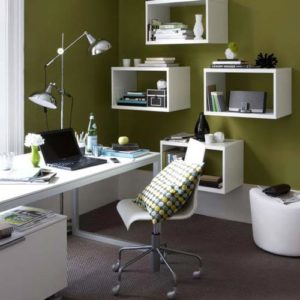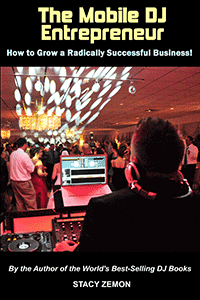
By Gregg Hollmann, “Party Professional”
This article explores the topic of DJ offices and alternative business models. This idea was sparked by a recent conversation with a business owner who owns a popular food franchise specializing in salads. Profits have been minimal, attributable to sagging sales and a hefty monthly rent of $6,800. I remarked to the owner, “that’s a lot of salads!”
Full-time office spaces - also known as “bricks and mortar” impose on business owners financial overheads. For this article, I spoke with several mobile DJ company owners who utilize full-time offices to learn about their experiences. For the alternative point of view, I’ll speak about my own business model that utilizes a home business office supplemented by offsite sales and planning consultations. There is no right or wrong business model - it’s more finding a system that best suits your lifestyle, brand and financial objectives.
Functions of An Office Space
A DJ office can fulfill many functions, serving as a place to:
-
Meet prospective and current clients;
-
Train staff;
-
Store equipment;
-
Hold showcases and networking events.
Both single operators and multi-operators can benefit from maintaining offices. Single ops must exercise caution since they have less revenue to cover their overhead. Multi-ops, on the other hand, have a greater number of gigs/revenues to help cover company overhead.
The Benefits of Having a Full-Time Office Space
In speaking with DJs using offices, the top benefit cited was “legitimacy.” That is, a company that has an office is perceived as a real business. Related to legitimacy is pricing power. Real businesses enjoy a higher perception by the consumer, and in theory should be able to command higher prices for their services. This market premium charged by the company can be used to cover the rent/office expenses, plus earn an additional financial return.
Following are thoughts from three DJ business owners who are utilizing full-time office space with great results: Vinny Liotta from Events by Cool Cat (Upstate New York), Steve Moody from The Steve Moody Entertainment Connection (Maryland’s Eastern Shore), and Christopher Atwood from Absolute Celebrations (Central New Jersey).
Steve Moody
Steve Moody is a highly-respected friend and colleague with an industry-leading wedding practice. Yet, he was cautious to open a full-time office and for many years operated a home-based business. With several years in his new office, here is Steve’s report:
“I would say that getting the office is one of the best things we have ever done as a company - and on so many levels. The most obvious reason being it gives a sense of legitimacy to the clients, but it goes so much further than that.
Think of how comfortable you are when you are in your own home and you have friends come to visit. You are so much more relaxed when it is your own place. I really feel that when we have clients come by I can just relax and be myself. I control the feeling of the meeting. I always want them to be relaxed and feel like they are sharing the details of their wedding with a friend and not someone who is trying to “sell them” something.
There are no distractions like there would be having it at a Starbucks, I am able to offer them something to drink or snack on. I am basically the host, already playing the same part that I would be playing at their wedding.
All of our awards are in plain sight, so I don’t have to sound like I am bragging about them when they ask. I am able to show couples a Power Point presentation on a large screen TV instead of on my laptop the way I used to.
Most importantly, after the initial part of our conversation, I am able to take them to our showroom upstairs that is set up like a mini-banquet hall so that they can see the photobooth, uplighting, custom monogram - first hand. I don’t have to “sell” anything. They see what they like and I just give them a price.
The office has also helped a bit with keeping work separated from home. While working from a home office there were always shades of gray especially with my kids (is daddy working? is he not working?).
One other great benefit is that it has saved so much time for me. I used to run sound and lighting equipment all over creation when our DJs needed any upsells or extras for their events. Now, with the office being almost centrally located, everyone is able to just stop in and pick up what they need and then return it when they are done.”
Vinny Liotta
About eights years ago, Vinny Liotta who at the time was running a single-op out of his basement and doing 30 events per year, had an epiphany at the Atlantic City DJ Expo after hearing Jason Jani (SCE) speak about the benefits of maintaining an office. Vinny moved his operations to a small storefront on a popular thoroughfare and reaped immediate benefits. After outgrowing that space, Vinny’s company stepped it up to the next level by renting a three-story, 3,400 square foot office with its own parking lot. In 2014, Events by Cool Cat booked over 600 events and Vinny won “DJ of the Year” at the DJ Times International DJ Expo in Atlantic City.
Vinny loves his expanded office space! Key benefits include the ability to “create a buzz and an atmosphere.” This fun atmosphere for Cool Cat includes a receptionist booth decorated with a DJ facade, decorative lighting, festive music and an occasional appearance by the miniature poodle mascot. Even with Events by Cool Cat’s prices being about 40% higher than the local market average, some 80% of office visitors book on the spot. All guests, whether booking or not, receive a Cool Cat branded bottle of premium wine.
Liotta says that maintaining an office legitimatizes a business and shows that a business is real. He shared a story about meeting with a wedding prospect at his office who did not sign up on the spot, stating that he had to meet with one other DJ before making a final decision. The next morning, the prospect called back Vinny to book his services, saying “that other DJ wanted to meet at a Dunkin’ Donuts, so I cancelled the appointment. Vinny, your business is the real deal.” Vinny also made an interesting point to DJs with this rhetorical question, “Do banquet managers visit prospective wedding clients at their homes?”
With multiple offices, Cool Cat can have 5 consultations going on simultaneously. The office also includes a showroom to demo the company’s various sound and lighting options, making it much easier to sell these services. Having a local office also affords the company branding opportunities and top of mind awareness as residents drive by its office or see its vehicles around town.
Christopher Atwood
Chris Atwood’s company, Absolute Celebrations, has been making a big splash in the New Jersey market with its high-quality productions and fun DJs/Emcees. The company maintains an office space in a residential home. Key personnel maintain modestly sized personal offices.
Atwood says that having an office allows him to manage his time better. Rather than traveling all over New Jersey to meet with clients and prospects, these parties now travel to him. Most wedding clients are agreeable to make the trip, and if they don’t care to visit the office, then a video conference can be arranged. Atwood points out that most engaged couples are living in apartments or modest homes, and don’t feel comfortable hosting home consultations. Mitzvah clients on the other hand generally have larger homes to host a consultation. For mitzvah clients, a home consultation may actually be preferable to accommodate the family’s busy schedule.
The primary benefit of having an office space according to Atwood is the “revenue enhancing opportunity” - that is the ability to book a larger number of events at a higher average price point. Atwood recommends that DJs, particularly single operators, exercise caution when taking on office space, being careful not to overextend themselves with big overheads that are difficult to cover.
Risks of Office Space
The monthly rent, plus related expenses (utilities, internet, office staffing) represent fixed monthly overheads. When signing a multiple year lease, you are typically on the hook for rental payments over the term of the lease meaning that if business softens (think the economic collapse of 2008), you can’t easily break the lease and downgrade to a less expensive space. If you do break the lease, the landlord can come after you for the remaining payments (note: laws for a landlord/tenant’s rights on this situation vary from state to state). Commercial landlords are often large corporate entities with the financial resources to enforce the legal terms of the lease. Don’t assume that your landlord will be flexible and empathetic to your situation.
To mitigate the risk of being consumed by overheads, consider entering into a shorter-term or flexible lease with renewal options. The downside of a short-term lease, particularly in a hot rental market, is that you subject yourself to significant rent increases. The landlord could also decide not to renew their lease with you, forcing you to move.
Business owners are wise to keep their rent expense at about 10% or less of annual sales. If you do decide to open an office space, be wary of building out a space that is too opulent and places your rent at 20% or more of sales.
The Home Office / Mobile Sales Model
The business model that I’ve been using since the inception of my company features a comfortable home office where I do paperwork and phone sales. Meetings with my DJ staff are held in my home office or at the dining room table. Sales and planning meetings are conducted out in the field at clients’ homes or neutral locations like Starbucks and Panera Bread (yes, hissing espresso machines and all!).
Working from home affords me zero commuting time and the flexibility to mix and match business with family time. Clients appreciate the convenience that I will travel to them and save them time and expenses. When prospective clients ask if they can come into our office, I typically reply by saying that we don’t have a full-time office space so that we can keep our overheads low and pricing competitive. Yes, I’m sure that we do lose the occasional appointment to the wedding couple who wants the full office consultation experience, but there has been no material detrimental impact to our business. I drive a lot and at times resemble a traveling salesman, logging 25,000 miles a year traversing the roads of New Jersey to appointments and performances.
On the point of legitimacy, even without a full-time office, a mobile DJ business can still feel legitimate with the benefit of a critical mass of online reviews (e.g., WeddingWire, The Knot, Yelp) and a strong digital presence. For example, our company website receives an average of 1,500 hits a day and we are active on all of the major social media platforms. In essence, our company emphasizes a strong digital storefront and opts not to maintain a bricks and mortar office location. We’ve also heard the comment numerous times from our millennial clients that they don’t like being forced to visit a DJ company office where they expect to be pressured into signing on the spot.
Lack of a fixed monthly rent keeps our company feeling lean and flexible. Furthermore, each year I am able to get a “home office” deduction on my income tax return that reduces taxable income/taxes. I recommend utilizing an accountant to properly prepare your home office deduction and enjoy the related tax savings.
In the future, and particularly after reading the success stories of the DJs cited in this article, I will definitely be re-evaluating our current business model.
In Conclusion
Is having a full-time office space right for your DJ operations? The three successful DJ company owners interviewed in this article believe that it’s a great fit for their businesses. On the other side of the coin, there is a strong case to be made for utilizing a low-overhead mobile sales model. Both styles of businesses are capable of flourishing.




